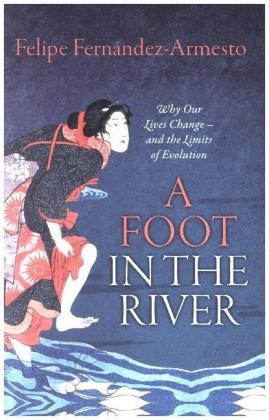
A Foot in the River
Oxford University Press (Verlag)
978-0-19-880680-6 (ISBN)
We are a weird species. Like other species, we have a culture. But by comparison with other species, we are strangely unstable: human cultures self-transform, diverge, and multiply with bewildering speed. They vary, radically and rapidly, from time to time and place to place. And the way we live -- our manners, morals, habits, experiences, relationships, technology, values -- seems to be changing at an ever accelerating pace. The effects can be dislocating, baffling, sometimes terrifying. Why is this?
In A Foot in the River, best-selling historian Felipe Fernández-Armesto sifts through the evidence and offers some radical answers to these very big questions about the human species and its history -- and speculates on what these answers might mean for our future. Combining insights from a huge range of disciplines, including history, biology, anthropology, archaeology, philosophy, sociology, ethology, zoology, primatology, psychology, linguistics, the cognitive sciences, and even business studies, he argues that culture is exempt from evolution. Ultimately, no environmental conditions, no genetic legacy, no predictable patterns, no scientific laws determine our behaviour. We can consequently make and remake our world in the freedom of unconstrained imaginations.
A revolutionary book which challenges scientistic assumptions about culture and how and why cultural change happens, A Foot in the River comes to conclusions which readers may well find by turns both daunting and also potentially hugely liberating.
Felipe Fernández-Armesto is the William P. Reynolds Professor of Arts and Letters at the University of Notre Dame. His work has been recognized as pioneering across a very wide range of fields, including global history, environmental history, colonial history, maritime history, religious history, art history, the history of ideas, Mediterranean history, Spanish history, American history, the history of cartography, and the history of language. He has published numerous best-selling history books, including Civilizations (Macmillan, 2000), Millennium (Bantam, 1995), 1492: The Year Our World Began (Bloomsbury, 2010) , and Pathfinders: A Global History of Exploration (2006), also published by Oxford University Press, which was awarded the World History Association Prize.
Introduction: The Weird Planet
1: Challenging Change
2: The Frustration of Science
3: The Great Re-Convergence
4: The Chimpanzees' Tea Party
5: The Limits of Evolution
6: The Imaginative Animal
7: Facing Acceleration
8: Towards the Planet of the Apes
In the Vatican Garden: Afterword and Acknowledgements
Notes
Index
| Erscheinungsdatum | 14.07.2017 |
|---|---|
| Verlagsort | Oxford |
| Sprache | englisch |
| Maße | 135 x 215 mm |
| Gewicht | 368 g |
| Themenwelt | Geisteswissenschaften ► Archäologie |
| Geisteswissenschaften ► Geschichte ► Allgemeine Geschichte | |
| Geschichte ► Teilgebiete der Geschichte ► Kulturgeschichte | |
| Geisteswissenschaften ► Philosophie | |
| Geisteswissenschaften ► Religion / Theologie | |
| Geisteswissenschaften ► Sprach- / Literaturwissenschaft ► Sprachwissenschaft | |
| Naturwissenschaften ► Biologie ► Evolution | |
| Naturwissenschaften ► Biologie ► Humanbiologie | |
| Sozialwissenschaften ► Soziologie | |
| ISBN-10 | 0-19-880680-9 / 0198806809 |
| ISBN-13 | 978-0-19-880680-6 / 9780198806806 |
| Zustand | Neuware |
| Informationen gemäß Produktsicherheitsverordnung (GPSR) | |
| Haben Sie eine Frage zum Produkt? |
aus dem Bereich


